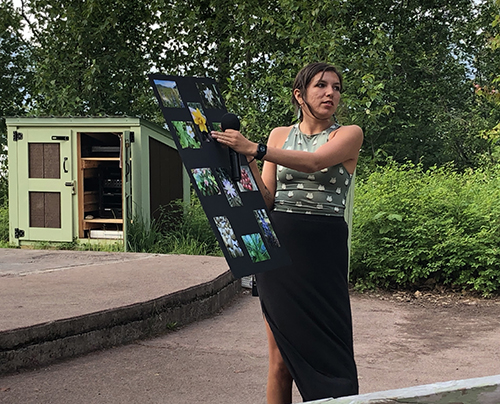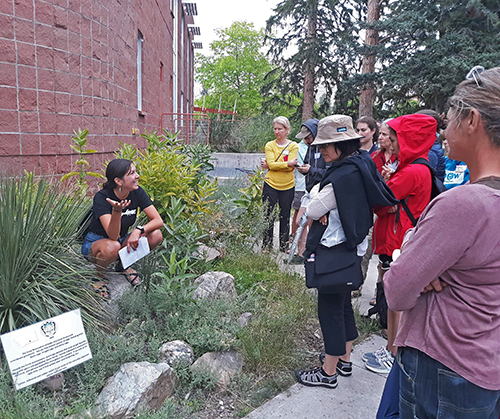###
UM Environmental Studies Grad Brings Indigenous Plant Knowledge to Community
MISSOULA – Rose Bear Don’t Walk is returning to her roots – and bringing some traditional knowledge back with her.
As the recipient of a prominent Fellowship of the Future from the organization 500 Women Scientists, she will teach her Salish community at St. Ignatius how to reclaim a diet revolving around native plants.

Bear Don’t Walk, who just graduated with her master’s degree in environmental studies from the University of Montana in December, first learned about food systems – and barriers to accessing healthy, nutritious and culturally relevant food for Indigenous communities – as an undergraduate political science major at Yale. She then enrolled at Syracuse University in New York for a graduate degree.
In a program in the SUNY Environmental Science and Forestry School, Indigenous students work in biocultural restoration and traditional ecological knowledge. But Bear Don’t Walk only attended for a semester.
“It was there that I learned I really wanted to work with traditional food and plants,” she said.
She instead transferred to UM to study the plants around the region she grew up in and began a thesis project titled “Recovering our Roots: Salish ethnobotanical knowledge for community wellbeing on the Flathead Indian Reservation.”
“I really, really loved the UM Environmental Studies program,” she said. “It was an awesome program for what I wanted to study.”
Bear Don’t Walk said when Indigenous peoples were assimilated into Western culture, they lost more than their traditions. They moved from an ancestral diet to a highly processed, globalized food system. Grocery stores and fast food restaurants on reservations led to an overabundance of foods Indigenous people weren’t used to and an underabundance of the foods they had relied upon for centuries.
The result was health depletion for the tribes, shown by low biomarkers for overall health and high levels of chronic health problems. Bear Don’t Walk said she has seen obesity, diabetes and hypertension up close in her own Salish community.

Now she wants to educate her community on how historical events affected their food systems and how to regain regional practices to keep traditions alive and improve health and wellness.
Bear Don’t Walk said some plants used traditionally for food sources are still well-known, such as camas, bitterroots and berries, but others have been lost.
She said although Indigenous knowledge is scientific, it is not always highly quantitative, so she wants to create a space to incorporate it into academia. Through her two-year fellowship, she plans to hold monthly ethnobotanical workshops and create educational materials for the first year and then incorporate what she has learned through the project in the second year.
Coming from a family of lawyers, Bear Don’t Walk never thought she would go down a scientific route – let alone be chosen among 100 applications as one of four finalists for a Fellowship for the Future. As an awardee, she will receive support for her project, an honorarium, mentorship opportunities, leadership training and recognition in the STEM community.
She said coming back to UM and to her community roots was the right choice for allowing her to work on her project.
“I think the University provides an environment to hone in on a specific thing you really want to work on, and there are a lot of people within the University system that are supportive,” she said. “The classes I took were centered on the botany of this region, and so just having that specificity within my coursework, a really supportive community and a great adviser and department, helped me flourish and figure out how to carry out this project.”
Bear Don’t Walk hopes eventually interest in her workshops will spread to wider communities and her “Recovering our Roots” project will be used in Flathead Indian Reservation schools.
Contact: Rose Bear Don’t Walk, UM Environmental Studies alum, 406-529-8002, rose.beardontwalk@umontana.edu.